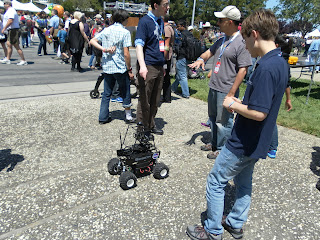The Mars Society NorCal chapter held its regular monthly meeting on August 16th, it was a very special meeting, the group was joined by Andrew Klofas from Senseta who delivered the assembled project rovers! The delivery was preceded by a formal review and acceptance of the hardware by Dr. Chris McKay, planetary scientist at NASA Ames, and the NASA Ames procurement team at a demo held at the CMU/Senseta robotics lab staff on July 27th. The acceptance demo included software and hardware demonstrations and a discussion on applications of the rovers at the MDRS, for educational outreach, and astrobiology/geology field science.
The NorCal team is now ramping up its activities around the rover project, members are engaged in setting up and helping develop the rover's kernel core and controle console software. This is now an open source project and a post on it will be published in the coming weeks. Delivery of the rovers will be followed by more testing both locally and again in the Mojave desert. Of primary importance is to gather more data on the performance of the wifi network components as remaining purchases of communications equipment rely on this data. Mechanical testing will give us the final data needed in order to complete the design of the facility (rover base) which will eventually house the rover while deployed at Mars Society's MDRS research station in Utah. Also the team is setting up the infrastructure for sharing future documents and information related to the rover project online with current and future collaborators and educators. As the rovers will also take part in a science and engineering outreach program in Bay Area schools we are ramping up activites related to documentation and presentation materials.
Lastly, a word of caution to those of you embarking into projects, or their management, involving government organizations trying new modes of cooperation with industry and advocacy and non-governmental groups. Budget extra time for the project. We have seen a string of delays which were generally caused by organizations trying to accomplish or process things outside their usual operational comfort zone. While always having support of dedicated individuals, it was several time necessary to readjust the initial project plan and in order to stay inline with established procedures, even though often some of these seemed out of proportion relative to the modest project budget. On the other hand, the extra time it took to get to this point was not all lost. Some of it was recouped by newer and more affordable communications technology which we conciously decided to purchase only once the rovers are delivered. This is possible as we are a nimble group and can handle changes in the project, this ability of course decreases as groups involved grow in size.
In any case, the equipment arrived and our group is excited to get rolling with all the ideas we discussed over the last several months. We are open to contributors and cooperation with other groups and individuals in science and education fields. For further information please contact the NorCal chapter of the Mars Society.
.

MS NorCal chapter members with the project rovers








